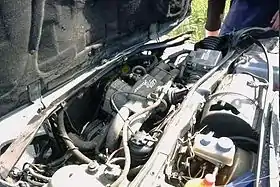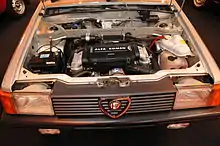Alfa Romeo Boxer engine
The Alfa Romeo Boxer engine was a water-cooled flat-4 piston engine developed by Alfa Romeo for front-wheel drive, longitudinal applications. It debuted on the Alfasud, which was introduced in 1971 at the Turin Motor Show.[1] In the following decades the Boxer went through several upgrades and powered many Alfa Romeo front-wheel drive cars up to 1996 (not the 164). In 1997 it was phased out and replaced by the transversely-mounted Twin Spark engines.
| Alfa Romeo Boxer engine | |
|---|---|
 | |
| Overview | |
| Manufacturer | Alfa Romeo |
| Production | 1971–1997 |
| Layout | |
| Configuration | Naturally aspirated Flat-4 |
| Displacement |
|
| Cylinder bore |
|
| Piston stroke |
|
| Block material | Cast iron |
| Head material | Aluminium alloy |
| Valvetrain | DOHC 2 or 4-valve |
| Combustion | |
| Fuel system | 1 or 2 carburetors Fuel injection |
| Management | Bosch LE 3.1 Jetronic or Motronic ML 4.1 |
| Fuel type | Petrol |
| Oil system | 4–4.5 L (4.2–4.8 US qt; 3.5–4.0 imp qt) |
| Cooling system | Water-cooled |
| Output | |
| Power output | 63–137 PS (46–101 kW) |
| Emissions | |
| Emissions control technology | Catalytic converter (on 1700 16V) |
| Chronology | |
| Successor | Twin Spark engine |
Description
This liquid-cooled, four cylinder, boxer (horizontally opposed) engine had a belt-driven water pump. Its integrated cast iron cylinder block and crankcase had three main bearings. The two aluminum alloy crossflow cylinder heads had one or two overhead camshaft in each, driven by individual timing belts, and two valves per cylinder (four valves per cylinder in the 1700 16V version). Wet sump lubrication.[2]
The fuel delivery system depended on version: a single-barrel downdraft carburetor; one or two double-barrel downdraft carburetors; Bosch LE 3.1 Jetronic fuel injection (8 valve engines).;[3] or Bosch Motronic ML 4.1 fuel injection (16 valve engines).[4]
1200
The original engine displaced 1.2 L (1,186 cc) with an 80 mm × 59 mm (3.15 in × 2.32 in) bore and stroke and produced between 63 and 77 PS (46 and 57 kW).[5]
Applications:
- 1971–1983 Alfa Romeo Alfasud
- 1984–1986 Alfa Romeo Arna[6]
- 1984–1986 Nissan Cherry Europe (rebadged Alfa Romeo Arna, sold also as Nissan Pulsar Milano on the Japanese market) [6]
- 1983–1986 Alfa Romeo 33 (late versions for export only)[7]
1300
The engine was stroked up to 64 mm (2.52 in) to create the 1.3 L (1,286 cc) version. This engine produced 68–75 PS (50–55 kW).[3]
Applications:
- 1977–1983 Alfa Romeo Alfasud[8]
- 1977–1983 Alfa Romeo Sprint[3]
1400
The 1.4 L (1,351 cc) was usually labelled a "1.3" in spite of its displacement. It produced 75–86 PS (55–63 kW) with one or two double-barrel carburettors.[9] It retained the 80 mm (3.15 in) bore but used the 1500s 67.2 mm (2.65 in) crankshaft.[5]
Applications:
- 1978–1983 Alfa Romeo Alfasud[10]
- 1978–1989 Alfa Romeo Sprint
- 1983–1995 Alfa Romeo 33[11]
- 1994–1997 Alfa Romeo 145
- 1995–1997 Alfa Romeo 146
1500

From 1978 until October 1986, the largest member of the family was the 1.5 L (1,490 cc) "1500" with 84 mm × 67.2 mm (3.31 in × 2.65 in) bore and stroke.[5] It was built until 1995 and produced 84 to 105 PS (62 to 77 kW).[3] This is the largest engine to have been installed in Alfasuds.[12]
Applications:
- 1978–1983 Alfa Romeo Alfasud[10]
- 1978–1989 Alfa Romeo Sprint[12]
- 1984–1986 Alfa Romeo Arna
- 1983–1995 Alfa Romeo 33
- 1985–1986 Clan Clover
- 1984–1986 Nissan Cherry Europe
1600
The 1.6 L (1,596 cc) produced 103 PS (76 kW). Bore and stroke is 84 mm × 72 mm (3.31 in × 2.83 in).[13]
Applications:
- 1994–1997 Alfa Romeo 145[14]
- 1995–1997 Alfa Romeo 146[15]
1700
In October 1986 the engine was increased in size to 1.7 L (1,712 cc), it was used in the 33 and later Sprints, power was between 105 and 118 PS (77 and 87 kW).[13] Bore and stroke is 87 mm × 72 mm (3.43 in × 2.83 in).[7]
Applications:
- October 1986 – 1995 Alfa Romeo 33
- October 1986 – 1989 Alfa Romeo Sprint[16]
1700 16V
In January 1990 a quad-cam 16-valve version of the venerable boxer was produced; it was the most powerful to date, with 129–137 PS (95–101 kW) with or without catalytic converters. Only available in fuel-injected form, the 1.7 16V was equipped with the Bosch Motronic ML 4.1 system.[13]
The last Alfa Romeo flat-4 was produced in 1997, after a run of 26 years.
Applications:
- January 1990 – 1995 Alfa Romeo 33 (2nd generation)[11]
- 1994–1997 Alfa Romeo 145[14]
- 1995–1997 Alfa Romeo 146[15]
References
- "Alfa Romeo Alfasud". alfaworkshop.co.uk. Archived from the original on 28 June 2010. Retrieved 16 June 2010.
- "Alfa Romeo Alfasud Technical Specifications". Unique Cars and Parts. Retrieved 31 December 2013.
- Rauen, Tim. "Alfasud: Technical Data". Tim's Alfa Romeo Page. Archived from the original on 27 December 2013. Retrieved 30 December 2013.
- Oldham, Adrian. "Technical Specifications 33 S 16V QV Permanent 4". 33 S Permanent 4. Retrieved 31 January 2019.
- Quattroruote: Tutte le Auto del Mondo 1992. Milano: Editoriale Domus S.p.A. 1992. pp. 8–9.
- "The Alfasud's successors with Boxer-engine". alfasud.alfisti.net. Archived from the original on 2007-11-18. Retrieved 26 November 2011.
- Quattroruote: Tutte le Auto del Mondo 1992. Milano: Editoriale Domus S.p.A. 1990. pp. 10–12.
- "Sales legends: Alfa Romeo Alfasud". Car Dealer Magazine (UK). 16 December 2008. Retrieved 30 December 2013.
- Büschi, Hans-Ulrich, ed. (10 March 1983). "Automobil Revue '83". 78. Berne, Switzerland: Hallwag, AG: 170–171. ISBN 3-444-06065-3. Cite journal requires
|journal=(help) - Koch, Jeff (February 2009). "Alfasud". Hemmings Motor News. American City Business Journals. Retrieved 30 December 2013.
Initial reports claimed that it was one of the smoothest fours of its era, with power that seemingly belies its displacement, while later iterations 'scream noisily up to peak revs like a real racer', according to one published report.
- "PASSION ON A BUDGET". Edinburgh Evening News. Johnston Publishing Ltd. Retrieved 30 December 2013.
- Honest John: Alfa Romeo Alfasud and Sprint - Classic Car Review | Honest John, accessdate: 28. June 2018
- Tutte le Auto del Mondo 1992, pp. 10–11
- "Cure for the common compact". Limerick Leader. Johnston Publishing Ltd. Retrieved 30 December 2013.
- "Passion, with practicality". Edinburgh Evening News. Johnston Publishing Ltd. Retrieved 30 December 2013.
- Quattroruote.it: ALFA ROMEO Sprint 1.7 Quadrifoglio Verde - In commercio da 11/1987 a 11/1989 - Quattroruote.it, accessdate: 28. June 2018
